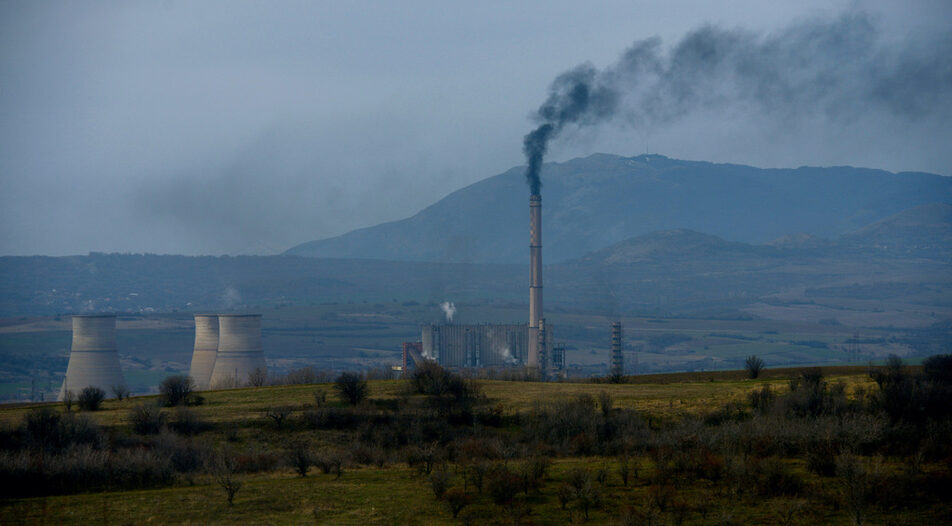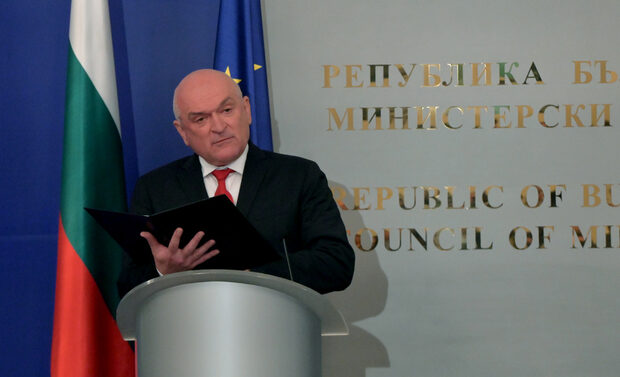Russia, says Europe nowadays, is the big danger for the energy sector and the economy as a whole. It's certainly true on a systemic, geopolitical level.
Yet geopolitics hardly matters in a place like Galabovo or Bobov dol. Both are small villages near big coal power plants. What matters there are the clouds of dust and dirt, falling from the sky from time to time. They clog the airways, make you cough, and lay you up in bed.
Or take Ruse and Pernik. Both cities have central heating systems which use no Russian gas whatsoever. Yet both burn garbage at a fast rate, and eco-organizations are claiming the filters there don't work, therefore polluting the air that thousands of people breathe every day.
What unites those places is not Putin. It's Hristo Kovachki - the guy whose business interests the European prosecution service (EPPO) targeted this week in a surprising blow.
Kovachki is the quintessential Eastern European oligarch - a type which has populated the region in the transition from communism to capitalism. He used to own a once-municipal bank and an insurance company, bought several coal mines and power plants and basically established control over parts of the country with the help of sympathetic regulators and politicians. He then returned the favor by ensuring his thousands of workers voted for whomever he told them to.
By all accounts, Kovachki was supposed to be bankrupting at a fast pace in the middle of the last decade, hunted by European regulations and the imminent demise of coal. Instead, by 2018, he was in the energy distribution business and was getting help from a whole range of state-owned companies to sell the electricity he still produces. At present his electricity trader is the biggest in the country by volume and profit and the whole Kovachki operation is worth several billion levs.
When I say "his", of course, I'm jumping over this invisible link which usually connects people like Kovachki to their empires. None of those assets was or is owned directly by him, therefore ensuring he is never directly implicated in any of the troubles surrounding them.
By now you must understand why coal plants, operated by Kovachki, are still in business and pollute places like Galabovo, why people there keep quiet and why the local or national authorities have kept their eyes closed for decades.
And that's why EPPO's attack on EU carbon emission trading was unexpected. No one gave much thought to European prosecutors. True, Bulgarians had invested some hope in them, thinking they could substitute the local prosecution service, which is still captured by political powers. But Brussels had been as quiet as ever these past two years, seemingly disregarding any wrongdoing here, just like it has been over the past 12 years.
It's telling that just a week before, after the new Magnitsky sanctions package, Kovachki gave his first interview to Capital newspaper, to assure he is "all for" the US interests in the energy sector and aligning himself geopolitically. The blow, though, came from another direction.
So it's all eyes on EPPO now. If they manage to bring down such a huge player in the Bulgarian economy, they will be a force to reckon with. If not, they will prove to be yet another impotent EU force trying in vain to rein in the wild East.
This newsletter is delivered early because of the national holiday tomorrow and is helped by:
Martin Dimitrov & Evgeni Ahmadzai& Monika Varbanova
1. Politics this week:
Speaking of Magnitsky troubles: do you remember Peevski?The former media mogul and MRF MP Delyan Peevski, or as the US has branded him - the "significant agent of corruption", has new troubles with the US Treasury Department. Peevski appealed the sanctions, prompting the American institution to reveal more of their report card on him. The Office of Foreign Assets Control (OFAC) filed a demand with the US court to dismiss Peevski's appeal in which there are several interesting bits of information.
For example in 2018, Peevski secured "the appointment of a person loyal and controlled by him to a senior government post". Several such positions were being filled in 2018, including the chairman of the Anti-corruption commission and the Interior Minister.
Another interesting part is the missing archive of the Bulgarian citizenship committee which has been "destroyed in 2020" as OFAC claims, thus affecting the investigation into whether Peevski has helped foreigners obtain citizenship in exchange for money.
Reformist forces pull slightly ahead in Alpha Research poll
With new elections approaching, it appears that the new reformist, pro-European coalition consisting of ex-ruling party WCC and their partners from Democratic Bulgaria is pulling ahead of GERB - at least according to this week's poll by Alpha Research, one of the more trusted sociological agencies. According to the results, the new coalition is projected to win 26.4% of the vote against Boyko Borissov's party, which gets 25.2% of respondents' support.
Interestingly, the Alpha poll also foresees fewer parties making it into Parliament for the first time since the start of the political crisis in the country in 2021. If predictions are right, only three other parties will cross the 4% barrier and send MPs in Parliament - MRF (13.2% of vote), Vazrazhdane (11.3%) and BSP (7.4%).
2. Economy:
More asphalt missingWhen foreigners do come to Bulgaria for the first time, they usually ask what's wrong with the roads. Incidentally, that is also the question the Regional Ministry tried to answer over the past fortnight, by testing some roads for quality control. As was to be expected (since journalists were invited to the testing and you don't do that unless you are sure you will find something) a number of violations, amongst which missing whole centimeters of asphalt, were found on the northern Sofia expressway. Same happened on the Hemus highway.
"The same thing arises from every inspection - 25-30% of the asphalt is missing," caretaker minister of regional development Ivan Shishkov said. The case would go to the European Public Prosecutor's Office, he vowed.
Not so fast, though
EPPO doesn't really have jurisdiction over the case, since it was finished in 2016, and the agency only operates on cases from 2017 onwards.
Also, why not pay some more to the same builder?
The same ministry keeps paying to the companies behind the Northern Sofia Expressway and other infamous works. Vodstroy 98, Hydrostroy, Road Works Veliko Tarnovo, Pattengeringstroy and Patstroy Burgas were among the first to receive the 288 million levs paid this week for road maintenance.
Figures:
1.4%The increase of the overall indicator of economic conditions for January of this year, which has already reached its highest value since mid-2021 according to the NSI.
250 million levs
The budget deficit reported by the Finance Ministry for the first two months of the year. By comparison, in the first two months of last year the state's finances were in the red by almost 715 million levs. The deficit is due to a faster growth of expenditures compared to revenues at the end of February.
More from this week:
3. Business:
Stock exchange Elmark investThe lighting producer plans to enter BEAM market, thus skipping the IPO round. The goal is 4.5 levs per share.
AI
TransmetricsThe Bulgarian AI company is working on optimizing the logistics of big transport companies and just got 2.5 million euro investment, half of which is from the European innovation council. Watch out for it.
More from this week:
Iris.ai receives a 2.5 million euro grant from Brussels
4. Energy
Westinghouse plans a new reactor in Kozloduy The words "We have started front end discussions about the engineering of the new reactor in Kozloduy nuclear power plant", were one of the highlights of the nuclear energy discussion during the conference of Energy and Power this week.Event attendee Elias Gideon, Vice President of Westinghouse Energy Systems, is the first figure involved in the project who has spoken publicly about the beginning of the new reactor's construction.
The technology AP-1000 is one of the most advanced in the nuclear systems and provides another step towards Bulgaria's plan to start renewing its nuclear fleet in Kozloduy. If work on the site starts this year, the reactor could begin commercial operations around 2035.
Bulgaria is also planning to start using Westinghouse's nuclear fuel from next year onwards for one of the currently operating reactors. Until now, Kozloduy NPP has used Russian fuel.
5. Brussels
Support for Ukrainian entrepreneurs- the Commission is launching two calls for proposals under the joint title "ReadyForEU", with a total budget of €7.5 million. The two calls aim at helping Ukrainian entrepreneurs and businesses to benefit from the Single Market.
Green Deal - The EU negotiators reached a long-awaited deal this week to set up a green bond standard - an instrument it hopes will provide investors with clarity that funds are being aligned with the region's climate goals. An agreement had been held up for a number of months over just how strict those rules should be.
6. Watch out for:
Date:Is the month when a new 212-million levs scheme for industrial parks opens for new candidates. It targets new parks and owners who want to develop such an industrial infrastructure and they will be able to file requests for 3 to 40 million levs.
People:
Alexander MorfovThe internationally renowned principal director of the National Theatre, who sparked controversy within the artistic community after protesting against the involvement of Turkish party MRF in the working of the institution, got fired this week. This, in turn, sparked protests against the CEO of the National Theatre, Vassil Vassilev.
Dobromir Andreev
Judge Andreev, known for his attempts to influence the work of his colleagues and for his contacts with the shady lobbyist Krasimir Georgiev, known as Krasyo Chernya, was elected President of the Administrative Court - Sofia City (ACSC).
Company:
TelusThe Bulgarian office of the Canadian outsourcing firm announced it will pull activities linked to the moderation of the Bulgarian language version of Facebook. This comes after several months of protests that the Bulgarian content moderators sanction anti-Russian commentators, while ignoring blatant pro-Russian propaganda.
Place:
Not in BulgariaNone of the main organizers of the illegal people-smuggling operations - which have dogged Bulgaria in recent months - is located inside the country, according to the Interior ministry. In total, 25 people have been named as organizers.
And, video of the week:
Tanks, obviously from NATO, are moving on Trakia highway.
Отечество - Fatherland
"The battalion lines up one last time, the old guard leaves, the newbies cry," a famous Bulgarian chalga song from the early 1990s goes. It depicts the sad reality of compulsory conscription in the military. With Bulgaria's entry into NATO and the professionalization of the army, several generations were spared from singing these melancholic rhythms.Now, however, "fatherland defense" classes are returning to Bulgarian high schools. While for now the plan is to have 10 classes in two years, both the far-right and the liberal left cried foul - the former saw it as a final proof that Bulgaria is preparing to enter the war in Ukraine, while the latter see it as a relic of the past (yes, those are the same people expecting Putin's tanks to roll across the Danube in case Ukraine falls).
Russia, says Europe nowadays, is the big danger for the energy sector and the economy as a whole. It's certainly true on a systemic, geopolitical level.
Yet geopolitics hardly matters in a place like Galabovo or Bobov dol. Both are small villages near big coal power plants. What matters there are the clouds of dust and dirt, falling from the sky from time to time. They clog the airways, make you cough, and lay you up in bed.












